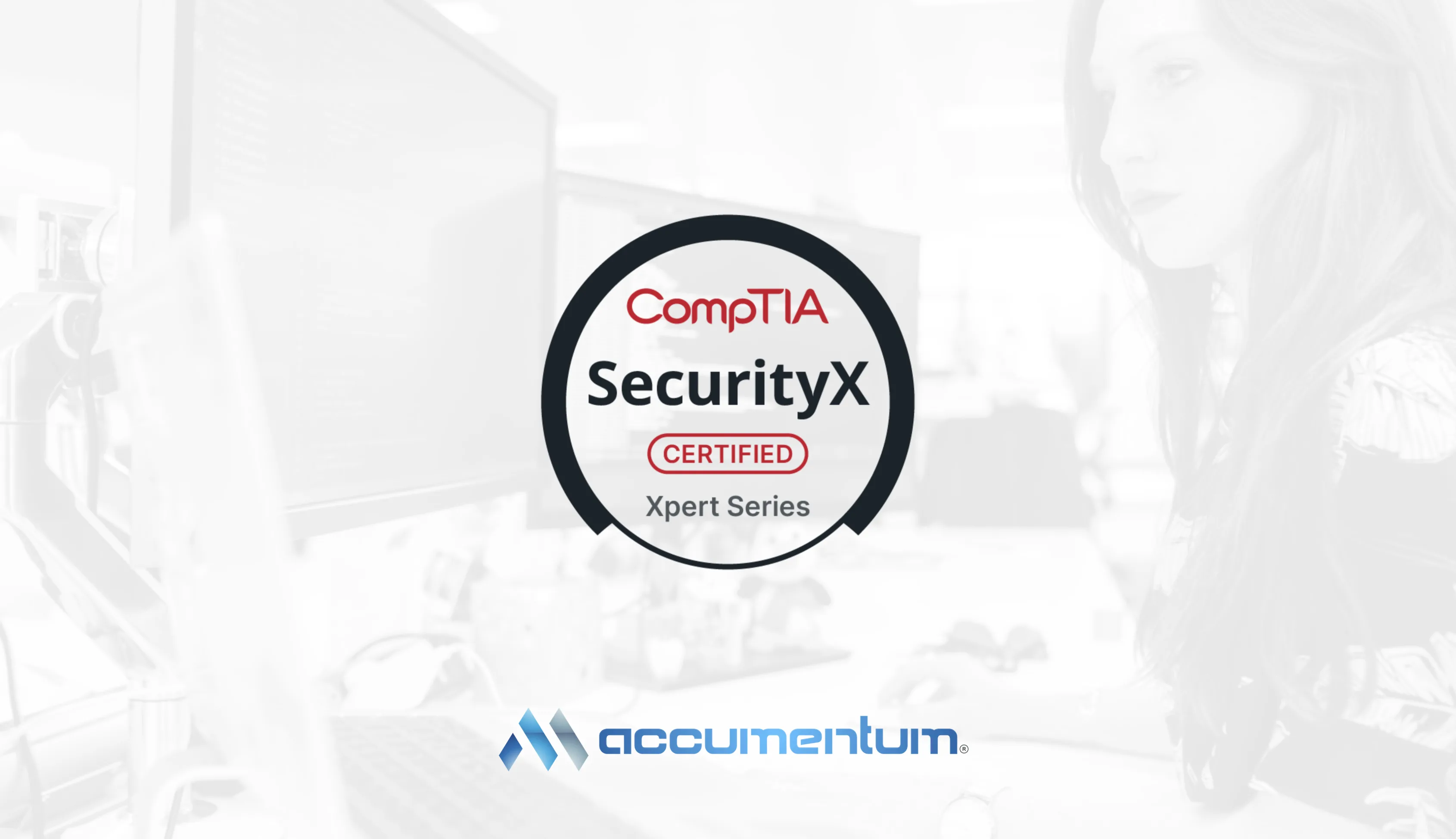CompTIA SecurityX Certification Training Course
Course Overview

Course Objectives
- Delve into the basic principles and core components of CompTIA SecurityX to establish a strong foundation in IT security management.
- Explore the comprehensive SecurityX framework, understanding its layers, security controls, and the lifecycle of security operations.
- Engage in practical exercises and case studies to apply SecurityX strategies, emphasizing threat detection, response, and mitigation in real-life situations.
- Master the implementation of advanced SecurityX practices to fortify IT security measures, ensuring they are in sync with organizational objectives and compliance demands.
Who Should Attend
- Those currently working in cybersecurity roles seeking to enhance their knowledge and proficiency in SecurityX methodologies.
- IT staff involved in security operations, infrastructure security, or compliance looking to deepen their security expertise through SecurityX.
- Managers responsible for risk assessment, compliance, and security governance who aim to integrate SecurityX strategies into their oversight.
- Individuals at the beginning of their cybersecurity journey who want to establish a robust foundation in IT security practices to propel their career forward.
Prerequisites
- Participants should have a rudimentary grasp of cybersecurity concepts or IT security basics.
- No specific cybersecurity or IT certifications are required, making this course inclusive for all levels of experience.
- Helpful if attendees have a general understanding of how cybersecurity supports business goals, though not a strict requirement.
- The course structure accommodates both newcomers to the field and seasoned IT security professionals, offering foundational to advanced insights.
Course Content
- Examine security models like CIA (Confidentiality, Integrity, Availability) and how they guide security practices.
- Introduction to various cybersecurity frameworks including NIST, ISO 27001, and how SecurityX integrates with them.
- Understanding the legal aspects of cybersecurity, compliance requirements, and ethical considerations.
- Principles of security governance, including policy development, risk management, and security strategy.
- Fundamental design principles like least privilege, defense in depth, and secure defaults.
- Techniques for securing operating systems, applications, and network devices against attacks.
- Applying security models in the design of enterprise systems for both cloud and on-premises environments.
- Explore patterns like microservices security, container security, and service mesh for modern applications.
- Utilizing threat intelligence for proactive security, including threat feeds and indicators of compromise (IoCs).
- Strategies for detecting and mitigating sophisticated, long-term cyber threats.
- Techniques for analyzing malware behavior, containment, and eradication.
- Understanding and disrupting the stages of cyber attacks through the Cyber Kill Chain model.
- Multi-factor authentication (MFA), biometrics, and single sign-on (SSO) technologies.
- Implementing role-based access control (RBAC), mandatory access control (MAC), and discretionary access control (DAC).
- Concepts and implementation of identity federation for seamless and secure access across organizations.
- Best practices for managing and monitoring privileged accounts and credentials.
- In-depth look at symmetric vs. asymmetric encryption, hashing, and digital signatures.
- Lifecycle management of cryptographic keys, including generation, storage, distribution, and destruction.
- Understanding common algorithms like AES, RSA, ECC, and their applications.
- Introduction to quantum-resistant cryptography and its implications for future security.
- Security aspects of protocols like IPv6, BGP, and their vulnerabilities and protections.
- Strategies for network segmentation to limit lateral movement in case of a breach.
- Configuring and managing IDS/IPS systems for network security.
- Securing wireless networks, including WPA3, and defending against wireless-specific attacks.
- Daily operations, tools, and procedures used in a SOC.
- From preparation through recovery, including lessons learned and improvements.
- Legal collection of evidence, analysis, and reporting for legal or internal purposes.
- Planning and implementing strategies for maintaining operations during and after security incidents.
- Principles of writing secure code to prevent common vulnerabilities like SQL injection and XSS.
- Integrating security into the DevOps pipeline for continuous security in development practices.
- Methods for ensuring software integrity, including code reviews, automated testing, and third-party assessments.
- Techniques for penetration testing, vulnerability scanning, and risk assessment of applications.
- Leveraging AI for threat detection, behavioral analytics, and automated response.
- Addressing the unique security challenges presented by the Internet of Things devices.
- Exploring how blockchain can enhance security in areas like secure transactions and identity management.
- Preparing for a future where quantum computing could break current encryption methods.
- Strategic approaches to service offerings and models.
- Designing services with customer experience in mind.
- Architectural principles for robust service design.
- Balancing service design between efficiency and effectiveness.
Course Features
Interactive Learning
Engage with expert instructors and peers through training sessions, discussions, and practical exercises.
Comprehensive Study Materials
Access extensive resources, including e-books, video lectures, and practice exams.
Real-World Applications
Work on real-life case studies and scenarios to apply project management concepts.
Certification Preparation
Receive guidance and tips to successfully pass the CompTIA SecurityX certification exam.
Certification Exam
Upon completing the CompTIA SecurityX Certification Training Course with Accumentum, you will be comprehensively equipped to take the CompTIA SecurityX Certification Exam. This certification will validate your expertise in cybersecurity, demonstrating your capability to implement SecurityX principles for enhanced security measures and operational resilience. This will significantly boost your career opportunities within cybersecurity roles.
Enrollment
Enroll in the CompTIA SecurityX Certification Training Course at Accumentum to start your path towards becoming a certified cybersecurity expert. For more details and to register, please visit Accumentum's registration page below.
